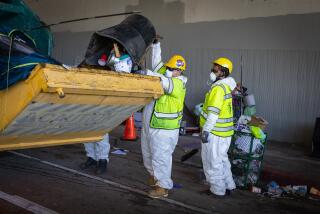Op-Ed: My first L.A. summer with AC
Three years ago I moved to Los Angeles in a quasi-dramatic bid to reboot my life. It worked out: I found a great job, good friends, and a nice little place with an enviable commute. The only thing missing was air conditioning, which everyone said was par for the course. It didn’t bother me, at least not at first. But last summer was tough, and this one broke me. A compact unit now sits in the bedroom window of my 1920s Spanish-style apartment, offering up great relief and more than a little bit of shame.
See, I grew up in Gilbert, Ariz., where conquering heat was part of my identity. Heat that turns your seat belt into a searing torture device and your car dashboard into a frying pan. Heat that melts the tread off your shoes. From what I could tell, Angelenos were overly theatrical, seemingly rendered catatonic by two weeks of mild discomfort in September. What Southern Californians called hot, we Southwestern desert rats called springtime.
My first summer in L.A. reinforced my Angeleno-mocking mind-set. It was “not that bad at all,” as I told my father. I felt like I had a clear answer for why the rental market had a distinct lack of window units – to say nothing of central air. “Dad, this whole SoCal weather thing is going to be great.”
Then Murphy’s Law kicked in.
According to the National Oceanic and Atmospheric Administration, June 2016 marked the 14th consecutive month for record global temperatures. Los Angeles is obviously not immune from these trends; our city is getting hotter right along with the rest of the planet.
Last October saw the worst heat wave in 25 years, and the longest run of 100-plus-degree days downtown. In February, several days were 15 to 20 degrees above normal – and for a full week the temperature hovered around 90. May was close to average, but June gloom gave way to triple-digit temperatures throughout the Southland. Palm Springs hit 121 degrees. Even Arizonans cringe at that.
As it gets hotter we’re using more energy to keep cool, which of course perpetuates the cycle.
So, yes, I confess: As the temperature broke records, I broke right along with them. The old box fan and frozen towel technique just wasn’t cutting it, forcing me to acknowledge that my vaunted heat endurance during those long Arizona summers had always been aided and abetted by climate control. Ten or 15 years ago, I have no doubt that I’d have managed L.A. just fine without a window unit; now that L.A. is heading toward Phoenix-lite, AC is more of a necessity than a luxury.
My local home improvement store was more than happy to outfit me with a solution; there, the AC units were on proud display right up front: cardboard-boxed monuments to our changing climate, with tired shoppers whispering reverently around them. Evidently I wasn’t the only Angeleno to decide I just couldn’t take it anymore.
Retail displays are anecdotal, but the strain on the grid is not. In June, the L.A. Department of Water and Power reported that energy demand skyrocketed to levels 50% higher than average, and overall usage on the hottest day that month fell just short of the record set only last September.
As it gets hotter we’re using more energy to keep cool, which of course perpetuates the cycle; air conditioning units are even less forgiving to the environment than they are to household budgets, and shelling out the extra hundred bucks for an Energy Star certificate doesn’t negate one’s contribution to the ultimate problem.
Still, though part of me may want to, I don’t regret my choice. My Arizona heat cred may be shot, and my carbon footprint’s a bit bigger, but I’m sleeping cool.
Kate Monninger is a writer and consultant. Follow her on Twitter @geekgrl42.
Follow the Opinion section on Twitter @latimesopinion and Facebook.
MORE FROM OPINION
After-school special: the Satan Club
Without more walkable cities, building new transit won’t reverse Metro’s ridership decline
Millennials are having less sex than any generation in 60 years. Here’s why it matters.
More to Read
A cure for the common opinion
Get thought-provoking perspectives with our weekly newsletter.
You may occasionally receive promotional content from the Los Angeles Times.






